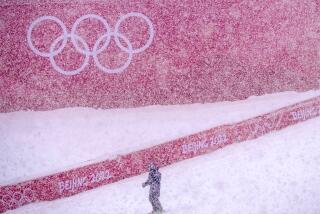End of Event Is Not End of Controversy : Skiing: Aamodt wins super-G handily, but discussion continues regarding Saturday’s downhill.
- Share via
ASPEN, Colo. — Ski racers and officials dropped their grudges long enough to complete a World Cup super-giant slalom on Sunday, but the respite did little to quell the controversy that rocked Saturday’s downhill at the Aspen Winternational.
Unlike Saturday’s race, the super-G went off without a hitch or a rut.
Norway’s Kjetil Andre Aamodt ran away from the field with a time of 1 minute 17.48 seconds, 0.53 seconds faster than runner-up Stefan Eberharter of Austria.
Daniel Mahrer of Switzerland, halted twice in the starting gate during Saturday’s downhill, recouped some of his lost weekend with a third-place finish.
So much for super-G.
Discussions quickly returned to the downhill, canceled after 16 runs because of a hole on the course that was--depending on who was asked--a serious safety concern or a political pawn.
American AJ Kitt, who was leading the race, was still fuming about the decision that cost him a second World Cup downhill victory.
“Up to that point, it was the greatest day in my life,” Kitt said.
Perhaps unnerved, Kitt did not ski well in the super-G, finishing in a tie for 37th. Teammate Tommy Moe, sixth in Saturday’s aborted downhill, finished 49th.
Kitt had bigger things on his mind.
Sunday, Aspen organizers officially defied the International Ski Federation (FIS) when they recognized the downhill results and awarded prize money to the top three finishers. Kitt received $30,000 for first place.
Mahrer, the downhill favorite, said it was unfair to award prize money in a race in which he and others did not participate.
“Nothing against AJ, but I don’t think that’s a good idea,” Mahrer said.
Also on Sunday, the U.S. team filed an official protest with the FIS about Saturday’s race. However, the attention of the controversy turned more to the FIS’ handling of the race than whether America was robbed.
Opinions varied among great racers as to whether the downhill should have been canceled. Kitt, understandably, considered the course in fine shape, much better than several European courses he has raced on this season.
Aamodt, however, said the cancellation was justified and took exception to an ESPN commentary that suggested the decision was politically motivated.
Kitt responded: “Every individual in the world has his own opinion. That’s a God-given right. Aamodt thought it was too dangerous. . . . I watched his run on TV. It didn’t look like it (the rut) had any effect on him.”
Almost everyone agreed the downhill was poorly managed and said that two FIS officials, Karl Frehsner and Sepp Messner, effectively caused the rut by altering the course.
Said Aamodt: “I agree the jury is very poor. They don’t make the right decisions. They never make up their minds. They should have seen it (the rut) before the race. They should have never started it in the first place.”
It was Messner who changed the downhill course this year, adding an extra gate in an attempt to make the race slower. Then, between training runs this week, the gate was moved to a different location.
The racers, who want more say in determining the course, said the gate placement forced them to brake sharply, causing the rut.
In a chance meeting on the street Thursday, Kitt ran into Frehsner and Messner and asked why they altered the course.
The FIS officials said the course was too dangerous.
“They said the training runs Wednesday were already faster than the race from last year,” Kitt said. “They were wrong.”
Kitt said he went back and looked up the times. He said the training times, in fact, were slower than in the previous year.
Kitt said safety should be a concern. But he said slowing down the courses will hurt the sport.
“Danger is a word synonymous with downhill,” he said. “That can’t change if the downhill is to stay alive.”
Kitt did not sleep well Saturday night.
“I’m disappointed with the international federation of our sport,” he said. “It’s something that’s difficult to swallow. There’s an apple in my throat right now that won’t pass. The sport of skiing, the sport I love, I see it nose-diving right now.”
More to Read
Go beyond the scoreboard
Get the latest on L.A.'s teams in the daily Sports Report newsletter.
You may occasionally receive promotional content from the Los Angeles Times.







